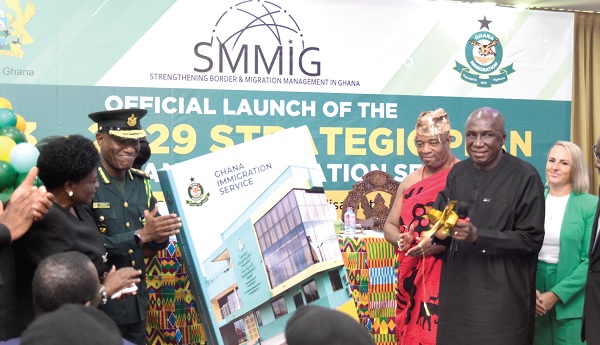
7-Year strategic plan launched by GIS
The Ghana Immigration Service (GIS) has launched a seven-year strategic plan intended to change the face of migration in the country.
Advertisement
The plan, which begins from 2023 to 2029, will provide a roadmap for the GIS to operate an efficient, fair and firm immigration work systems through digitalisation.
The initiative, launched in Accra yesterday, was attended by government officials, the Ga Mantse, King Tackie Teiko Tsuru, heads of security agencies, members of the diplomatic corps, civil society organisations and development partners, among others.
Development of plan
The Comptroller-General of Immigration, Kwame Asuah Takyi, said since 2011, his outfit had been developing strategic plans to guide its operations and administrative activities.
With the expiration of the 2018–2022 plan, he said the service commenced the development of the new plan with technical assistance from the International Centre for Migration Policy Development (ICMPD) under a project called "Strengthening border and migration management in Ghana" which was funded by the Denmark Government.
Mr Takyi said the plan was developed through a participatory approach that involved officers at various levels across the GIS regional commands, departments, sections and units, as well as stakeholders from the government, international organisations, development partners and civil society representatives.
The process of formulating a new strategic plan, the Comptroller-General added, offered the service the opportunity to take stock of past successes and failures and in line with best practices.
He, therefore, said the plan would help the service to position itself strategically in its operational environment by aligning effectively with the changes taking place in its environment.
Mr Asuah Takyi, however, called for more support for the successful implementation of the plan and said “the long-term survival of GIS depends on sound strategic decisions effectively implemented.
“We will, therefore, require all hands on deck to realise our vision”, he added.
Commendation
The Minister for the Interior, Ambrose Dery, commended the GIS for the initiative and said the plan was well thought through because it clearly outlined strategies the service would adopt to realise its mandate.
He said he was aware of the extensive consultations in the development of the plan “so we can be assured that the concerns of all relevant stakeholders have been captured”.
Mr Dery, therefore, urged stakeholders in the migration management space to support activities outlined in the plan.
“As we continue our commitment to promote a humane and orderly management of migration, it is necessary for us to collectively maintain a well-coordinated multi-sectoral intervention to aid the process”.
Human rights
The project manager of ICMPD, Ghana, Lulia Jolley Socea, said “at the centre of migration are actual people, individual migrants affected by the work of border agencies such as the GIS which is why respect for human rights and integrity and gender-responsiveness are important themes in this strategic plan”.
Migration governance, she added, was not a one-agency job and, therefore, appealed for further support to implement the “ambitious plan”.
The Danish ambassador in Ghana, Tom Norring, said Denmark placed importance on migration, hence the reason for its continuous support to the GIS initiative.




